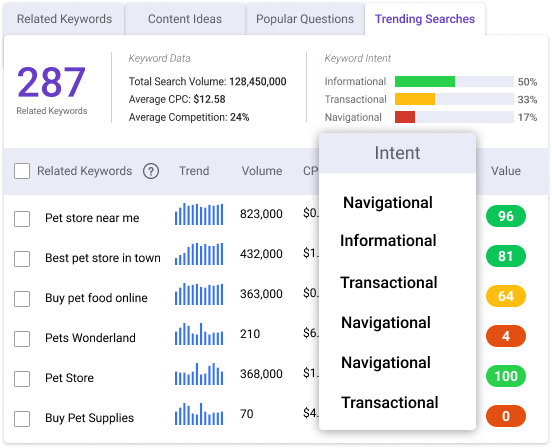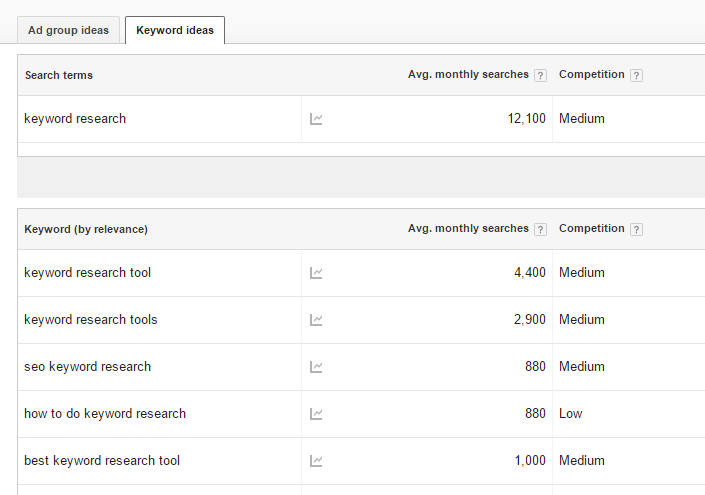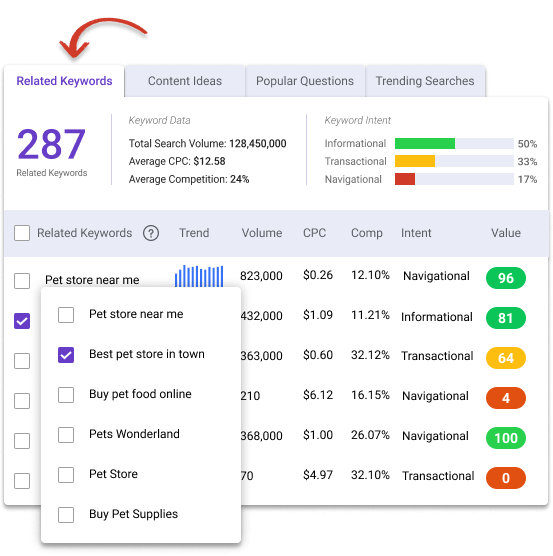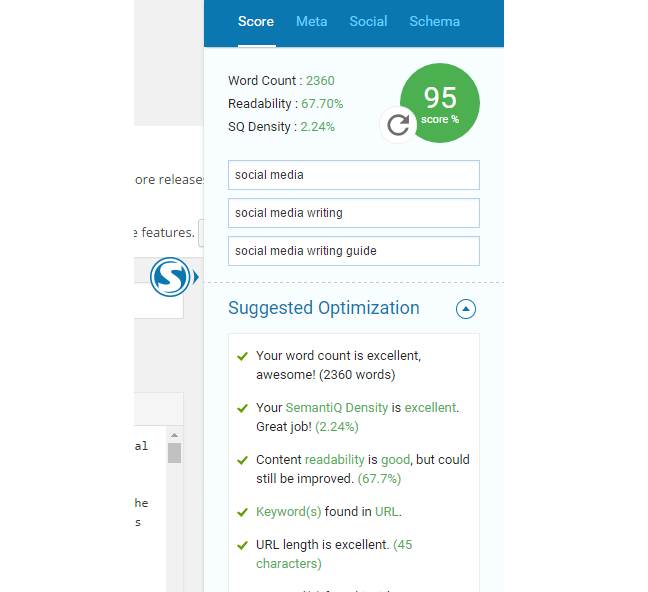Steph W. from SEOPressor


...help you check your website and tell you exactly how to rank higher?


93
score %
SEO Score

Found us from search engine?
We rank high, you can too.
SEOPressor helps you to optimize your on-page SEO for higher & improved search ranking.
By vivian on September 30, 2019

Today, we’re taking it back to basics. We have a long history of creating in-depth blog posts on the small details that can make a big difference to your SEO. But we have been guilty of overlooking the humble keyword.
Like scientists splitting the atom, there’s a whole world of detail beneath this simplest, most fundamental part of all digital marketing.
What is keyword research and why keyword research? Well, keywords are called keywords because they unlock audiences. That’s how I like to think about it anyway. They open the door to your efforts of being discovered and engaged with online. Without that, you have nothing.
Keyword Research in digital marketing is something people often associate with SEO, but just like atoms form all molecules in the universe, keywords are fundamental to all of the digital marketing. A good digital marketing strategy should be informed at every stage by the right keywords.
But what are the right keywords?
We’ll be exploring that question, helping you discern relevant keywords, and select them with traffic, sales, and ROI in mind.
We’ve already covered the basics of 9 types of keywords in SEO you need to know to convert, so if you need a definition, start there. Then come back here, and pick up where you left off.
Ready to bring in qualified leads, increase your conversion rate and generate real revenue? Read on!
Here’s a bit of knowledge from another part of the marketing world – posters. It’s called AIDA.

You need to think of keywords like they’re posters. The point is to generate interest in action – namely, clicking a link that leads to your website.
Search for the keyword “digital marketing” into Google. What do you see?

That’s because this keyword is as broad as it gets. It’s a whole discipline. People looking for “digital marketing” are probably only just thinking about launching their first website.
Now type in “digital marketing trends 2021”.

Go-agency.com wrote this in July, a full five months before 2021. It gave the article time to rank, and the keywords reflect Interest, Desire, and Action. Those looking for this keyword in May are strategic long-term thinkers looking to find actionable advice that will give them an advantage.
This is the difference between unqualified and qualified leads. In a nutshell:
I recommend always trying to target qualified leads, and you do that by getting specific about your keywords. If a keyword has an incredible search volume, it doesn’t really matter if the quality of traffic is poor. You are looking for keywords that strike the right balance between volume and quality. You can look at the importance of keyword research being targeted at qualified leads like airing your commercials at the right time.
[bof_display_offer id=8423]
With that in mind, we can now look at how to do keyword research.
If you are looking at how to do keyword research, chances are you already have a website and you’re disappointed with your traffic. Despite this fact, you may actually rank for keywords you simply aren’t exploiting properly.
Google Analytics can tell you what keywords people are using to find you, just go through Acquisition > Search Console > Queries to find a list of the queries that caused people to click on your site.
If you don’t know what keywords you already rank for, you can use my favorite tool: Rank Intelligence

Rank Intelligence is a great tool that helps you find out what keywords and pages your site is ranking for.
You can also filter the ranking position to see only those keywords ranking on page one. Just click the ‘Advanced Filter’ and select your preference as shown below.

Other than knowing what keywords you are ranking for, you can also find them complete with helpful keyword metrics like search volume, cost per click, and competition. Also, you can check if the ranking keywords have any featured snippets on the search results!
What are you waiting for? Check your ranking keyword for free now!
While the above information might help you understand what your competitors have historically managed to rank for, it won’t tell you what they’re up to right this minute.
Fortunately, if they want to rank for keywords, those keywords will have to be put in the title, description, and metadata of their articles. All of these are available for you to view if you’re willing to pore over the source code. Simply go to their website, or a specific article, and open the console to view the source code. Here’s a breakdown by the browser for PC and Mac:
Once you’ve opened the console, use “find in page” in the browser tools to search for “meta”, “h1” “h2” and “image” – pay attention to what words or phrases get repeated and you should be able to identify the keywords they’re trying to rank for.
If you know what they’re ranking for, it all depends on how much you trust them to have used best practices in finding their keywords. If your competitor is far larger and more dominant than you are, you may wish to avoid these keywords and find others.
However, if you put the keyword into Google and find a few good results, you could enter direct competition with them and try to get that traffic for yourself. Just be sure to measure your keywords in Google AdWords Keyword Planner to find out how popular and lucrative they are.
If you’ve been using Google regularly for the past couple of years, you’ll doubtless have taken advantage of Google Autocomplete. Well, so is everyone else.

What’s more, you can see at the bottom of the first page a shortlist of the most popular related searches.

This information comes from simply checking out the first page of Google, which is all your potential customers will do in 90% of cases. Replicating their behavior will allow you to optimize your content to what your customer base is doing.
Start thinking outside of the box, I want to challenge your assumptions for a second here.
Why do you want to know how to do keyword research? Chances are, to appear at the top of Google searches for your product or service, right? Well, finding keywords and populating them on your own page may not be the smartest way to get that same result.
The whole point of using keywords is that consumers are using them too. But once they’ve used them, what do they do next? The typical journey of acquisition goes something like this:
At no point does this say “Use google keywords to identify websites trying to rank and choose from one of them.” The second and third steps are the ones we’re interested in today.
Increasingly, lists are getting featured at the top of Google. I’ve decided I want to get into hiking and I want the best gear. So I type in “best hiking gear brand”. I get a list recommending products from an influential site immediately.

So when it comes to keywords, knowing what high authority websites and influencers dominate them is useful. Instead of competing, look at guest posting. Send them a product to review. Look at influencers on Social Media (Instagram in particular) and try to get featured by them.
Before we move to the next point, let me quickly share how you can discover what consumers really want when they perform a search.
Type any keyword in the Keyword Intelligence, and you will see the keyword’s intent.

As you can see, the keyword’s intent will help you to understand better what your customers are looking for when they type in the keyword in the search box.
Learn more about why user intent is critical to a successful SEO.
We’ve hinted at this with Google’s “related searches” list at the bottom of the first page, but this rabbit hole goes down a lot further.
Using Thesaurus on your keywords can open up a huge array of new opportunities. Run these synonyms through AdWords’ Keyword Planner, and you can identify new potential opportunities.

Another essential component of making the keywords you’ve identified work hard is discovering the LSI keywords associated with it. LSI, or Latent Semantic Indexing, basically means “related or shared meaning” – similar to the thesaurus idea above.
Using LSIGraph, you can put in your keyword to find long-tail keyword alternatives that are already popular search terms.
Here’s one more extra tool for you amazing people! Meet Keyword Intelligence.
Once you have entered your keywords and selected your preferred language and location, you will see a list of related keywords.

All these keywords come with their important metrics including trend, volume, cost per click, competition, type of intent, and value.
The keyword value will guide you in deciding which keywords to use. In other words – the higher the value of the keyword is, the higher the traffic it can potentially bring to your website.
And when you think you’ll need to pay a high sum for all the intelligence mentioned above, YOU’RE WRONG!
Because this tool is designed to give cost control back to the hands of SEOs and marketers like us. As their tagline says “Pay Only For What You Use, And Don’t Pay For What You Don’t Use”.
The best part? When you sign up, you will automatically be entitled to a free-tier account. Yes! That means you can start using them for free.
Once you signed up to the Keyword Intelligence, you also get free access to its keyword extension: LiveKeywords
It works just like Keywords Everywhere, but it’s free.
You can find all the important keyword metrics right from your browser. These include search volume, CPC, and competition.
Other than that, it also shows the Related Keywords and Related Searches to your main keyword.
I have been using them and it works great for my keyword research!
Keyword research process may feel basic, even mundane, but it’s absolutely essential to success, so it’s worth doing it well. With these resources, you’ll be able to ensure you maximize the benefit you get from the time you spend doing keyword research.
Once you’ve done it, it’s time to optimize your content using SEOPressor.

 You can use it to input up to 3 keywords and get suggestions on how you can better optimize your content to maximize its rank on Google.
You can use it to input up to 3 keywords and get suggestions on how you can better optimize your content to maximize its rank on Google.When was the last time you performed keyword research on your website? Tell us in the comments below. Any tips and tricks on how to do keyword research you know that we haven’t included here? Share them with our readers!
This post was originally written by Joanne and published on December 13, 2017. It was most recently updated on July 30, 2020.
Updated: 31 January 2026


Save thousands of dollars (it’s 100x cheaper)

Zero risk of Google penalty (it’s Google-approved)

Boost your rankings (proven by case studies)
Rank High With This Link Strategy
Precise, Simplified, Fast Internal Linking.
